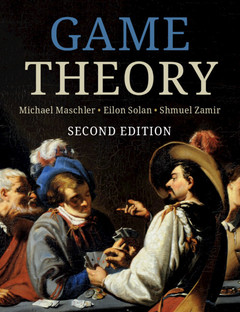Description
Game Theory (2nd Ed., Revised edition)
Authors: Maschler Michael, Solan Eilon, Zamir Shmuel
This new edition is unparalleled in breadth of coverage, thoroughness of technical explanations and number of worked examples.
Language: English
Subject for Game Theory:
67.54 €
In Print (Delivery period: 14 days).
Add to cart
Game Theory
Publication date: 06-2020
1050 p. · 18.9x24.4 cm · Paperback
Publication date: 06-2020
1050 p. · 18.9x24.4 cm · Paperback
Approximative price 158.58 €
In Print (Delivery period: 14 days).
Add to cart
Game Theory
Publication date: 06-2020
1050 p. · 19.8x25.3 cm · Hardback
Publication date: 06-2020
1050 p. · 19.8x25.3 cm · Hardback
Description
/li>Contents
/li>Biography
/li>
Now in its second edition, this popular textbook on game theory is unrivalled in the breadth of its coverage, the thoroughness of technical explanations and the number of worked examples included. Covering non-cooperative and cooperative games, this introduction to game theory includes advanced chapters on auctions, games with incomplete information, games with vector payoffs, stable matchings and the bargaining set. This edition contains new material on stochastic games, rationalizability, and the continuity of the set of equilibrium points with respect to the data of the game. The material is presented clearly and every concept is illustrated with concrete examples from a range of disciplines. With numerous exercises, and the addition of a solution manual for instructors with this edition, the book is an extensive guide to game theory for undergraduate through graduate courses in economics, mathematics, computer science, engineering and life sciences, and will also serve as useful reference for researchers.
1. The game of chess; 2. Utility theory; 3. Extensive-form games; 4. Strategic-form games; 5. Mixed strategies; 6. Behavior strategies and Kuhn's theorem; 7. Equilibrium refinements; 8. Correlated equilibria; 9. Games with incomplete information and common priors; 10. Games with incomplete information: the general model; 11. The universal belief space; 12. Auctions; 13. Repeated games; 14. Repeated games with vector payoffs; 15. Social choice; 16. Bargaining games; 17. Coalitional games with transferable utility; 18. The core; 19. The Shapley value; 20. The bargaining set; 21. The nucleolus; 22. Stable matching; 23. Appendices.
Michael Maschler was a Professor at the Einstein Institute of Mathematics and the Center for the Study of Rationality at the Hebrew University of Jerusalem, Israel. He greatly contributed to cooperative game theory and to repeated games with incomplete information.
Eilon Solan is a Professor of Mathematics at Tel Aviv University. He currently serves as the Director of the Beno Arbel program for gifted young students, and as the Academic Director of the Israeli team to the IMO.
Shmuel Zamir is a Professor at the Hebrew University of Jerusalem. He is a founding member of the Center for Study of Rationality, and is the editor-in-chief of the International Journal of Game Theory (IJGT).
Eilon Solan is a Professor of Mathematics at Tel Aviv University. He currently serves as the Director of the Beno Arbel program for gifted young students, and as the Academic Director of the Israeli team to the IMO.
Shmuel Zamir is a Professor at the Hebrew University of Jerusalem. He is a founding member of the Center for Study of Rationality, and is the editor-in-chief of the International Journal of Game Theory (IJGT).
© 2024 LAVOISIER S.A.S.




